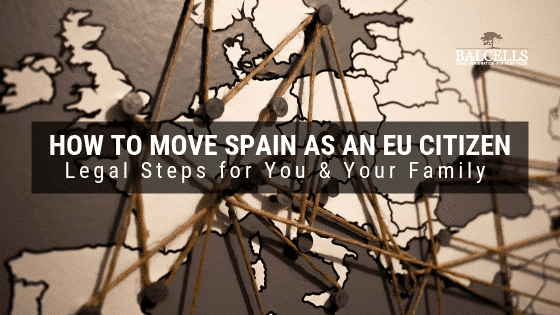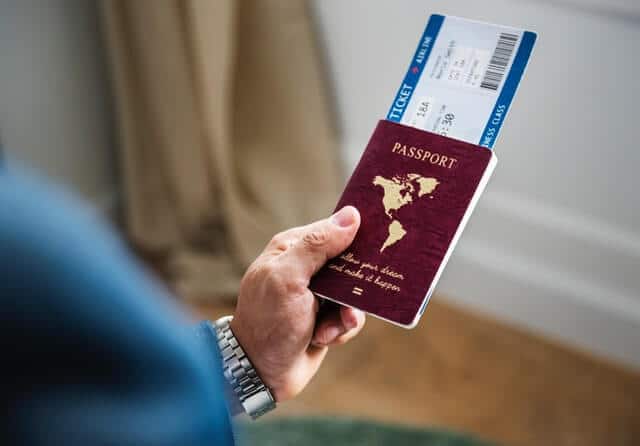Would you like to know how to move to Spain as a European Union citizen with your family? Then keep reading, because in this article we are going to teach you how. We are going to highly the process to get the EU registry certificate and everything you need to know regarding how to start living and working in Spain as an EU national. The process is easier than you may think!
What do you need as an EU citizen before moving to Spain?
Before diving into more legal specifics, let’s first understand what exactly you need as an EU citizen if you wish to move to Spain successfully.
And the first question is, do you really need to apply for a regular residence permit?
No. You don’t need to go through the general (long and tedious) immigration process required to obtain a residence permit or visa in Spain. If you are from the EU, things are much easier than that.
Unlike all the residence permits and visas for non-EU citizens, if you are a European Union individual the applicable legislation will be the Community Regime.
Individuals from the European Union, members of the European Economic Act (meaning those from Norway, Island, and Liechtenstein) and Swiss nationals don’t need a residence permit or visa in order to live and work in Spain.
This makes it really easy for you to move to Spain and start your new life with your family here. The process is really simple and straightforward.
But, apart from that, the move to Spain checklist for EU citizens contains a couple more things. You will also have to:
- Find a place to live, and have a rental agreement or the property deed of a purchased property
- For that, you will also need your empadronamiento, the registration at your city hall
- In case you are going to work, you will also have to apply for a Social Security number, which can be done online. Here’s a guide on how to do it.
- And, finally, get the legal part sorted out. That is what we explore next in this article.
What are the legal steps any EU citizen moving to Spain has to realize?
Even though you don’t need a visa or residence permit, you may be required to embark on one additional legal step. And that will depend on how long you would like to stay in the country:
- If you are planning to stay for less than 3 months in Spain, maybe due to your holidays/tourism, then you can freely enter the country. No need to request any kind of document.
- Things are different if you will stay for more than 90 days. You will then have to register and obtain your certificate, register your address and demonstrate you have sufficient economic funds to sustain yourself in the country, providing a health insurance contract.
But we still have one unaddressed group of people.
What will happen to British citizens? If you are from the UK we recommend you to first read our article UK citizens in Spain.
What is the EU registry certificate?
The EU registry certificate is the legal document any European Union national wishing to live and work in Spain for more than 3 months has to request in order to become legal in the country.
Obtaining this document is really straightforward, and you can do it in just 24 hours.
This certificate of registration as an EU national is a simple document that provides evidence that you have registered in the Central Register of Foreign Nationals here in Spain.
In the next section, we will explore how to obtain it step by step and which are its main requirements.
Do you have any doubts so far? Ask our lawyers anything:
How to get residency in Spain for EU citizens in 3 simple steps
Let’s now move to the important part: the actual legal steps you will need to follow to get the EU residency. Again, remember that this process is only required if you will stay for more than 3 months in the country.
Here you will find all the details you need in order to become a permanent legal resident in the country.
And we have divided this process into 3 different sections to make it easier for you:
1. Finding a place to live
This will be the first step in your journey.
And in fact, this is a crucial step, as without a permanent residency/address, you can’t get registered as an EU citizen living permanently in Spain.
You must show proof that you are living in the country, and that is demonstrating by having a rental contract or property deed.
So the first thing you will have to do is find a place to live in, even before moving to the Spanish territory.
Spain is completely diverse and there is no place better than the other. But just to give you some advice here, you can access our guide with the 5 places to live in Spain for expats.
Should you buy or should you rent?
Once you have chosen the city or town you will move to, you have to decide whether to buy or rent. And that can have some implications for your legal registration.
- If you purchase a property (an apartment or a house), there won’t be any problem. You just need to provide the contract deed (“nota simple” in Spanish), and it will be enough to demonstrate that you have an address in Spain.
- But, what happens if you are renting? Then you must make sure the rent is at least an 11-month contract or longer, as mid-term contracts are not always accepted. Our advice is to get a long-term one, as it will be the key to ensure a successful application.
2. Register yourself (and family) in your town hall (“Empadronamiento”)
Once you have your new house or flat, it’s time to register your address as a resident at the local town hall, a process called “empadronamiento”.
This simply means that you need to enroll in the municipal registry, stating which will be your address and defining the names of the individuals who will start living there.
This is how the town hall controls the number of inhabitants living in the municipality.
Furthermore, that will enable you to register your children in school, get subsidies from the government, vote on the European elections, etc.
The process is really simple and fast, and you will only need to submit:
- Your passport and a copy of it.
- If you are renting your rental contract, and if you have bought a property, a document that accredits the transaction.
- Submit a resident register form you will be granted at the town hall during the application
And that’s it! You will receive the so-called “certificado de empadronamiento”, and then you can move to the next step.
3. Get your residency card (TIE)
The last step in the legal immigration process is obtaining your TIE or residency card (“tarjeta de identidad del extranjero”). This is the card that will enable you to stay legally in Spain as a European Union citizen permanently.
How does the process exactly go?
As you are from the EU, there is no need to request your visa at the consulate of your country of origin. You can directly travel and enter Spain without any problem, and initiate the procedure here.
You will need to book an appointment at the Police Office. Depending on which region you are based in, you must choose one office or the other. You can check which Immigration Office corresponds to your location here.
What you will have to do there is obtain your “Tarjeta de Identificación del Extranjero”, also called TIE.
We are talking about the document that demonstrates your registration on the Central Registry of Foreign Nationals.
Which are the required documents you must submit?
On the day of your appointment, you must bring the following documents:
- Your passport (a valid one) and copy of it.
- The document that certifies the possession of sufficient economic funds. Also, if you come with your family and they are dependent on you, you must also need to demonstrate how you can handle their living expenses.
- Private or public health insurance contract. Bear in mind that the European Health Insurance card may be valid here. And, if you won’t work in Spain, you need to have a private one.
- Applicants who are under 16 need to present a birth certificate.
- Rental contract.
- Padrón, the address register we mentioned in the prior step.
After that, you will receive the “Certificado de registro como residente comunitario” (resident’s registry certificate for community citizens). That document will include your NIE number, as long as your name and address.
What is this NIE number?
The NIE is the basic identification number that foreign citizens need in order to initiate any kind of legal procedure: opening a bank account, buying a card, purchasing a property,…
So pay close attention to one important detail. As you have seen, unless you will buy a property or initiate any kind of utility contract, you don’t need to get the NIE beforehand: it will be given to you with your residence card.
That NIE is stamped on a card colored in green, hence its name “green card”.
Finally, bear in mind that the EU certificate doesn’t work as an ID. You need this green card and your passport to be identified against the authorities.
How to demonstrate the possession of sufficient economic funds
As we have just mentioned, one of the documents you will have to submit is the one demonstrating you have enough economic means to sustain your life in Spain.
But how can you do that? There are different ways here.
As a general rule, you can use an income statement, work contract, poof of your assets, etc. The most common method used is the presentation of a bank statement showing your income for the past 6 months.
If you are a self-employed individual who has created a company, you need to demonstrate your company’s operations.
In case you work for someone abroad, you must present the work contract in which the amount of money you earn can be seen.
And, finally, if you receive a pension, show your pension statement.
Legal process to bring the family members of a European Union citizen to Spain
Of course, you can move together with your family. Your spouse, kids and even other relatives can also get their residency in the country.
Nevertheless, the process differs depending on their nationality.
Process if they also are EU citizens
If they are European Union citizens, from the EEA, or from Switzerland, the process will be exactly the same as we mentioned above. With no difference.
The advisable thing is to start a joint application and navigate trough each step altogether. This makes things much easier.
This will work for your spouse, registered civil partner, children under 21 years old or dependent relatives.
Moving to Spain with your family if they are non-EU
But, what happens if those relatives are from a non-European Union country?
Then the procedure is a bit more complicated. In this case, they will need to get a regular residence permit, the permit as a family member of a European Union citizen.
There are several differences when it comes to getting this visa. The process must be initiated at the Spanish consulate located in the country of origin. There, the kinship relationship must be accredited throughout the relevant documentation.
This basically means that, thanks to you being a European Union citizen living legally in Spain, they can also get the residency in the country.
Hence, you can now understand why constituting a civil partnership in Spain with your non-EU partner is so important. It can grant him or her the possibility to become a Spanish resident easily.
Work permit for EU citizens
How can you ensure that you become a legal worker in Spain?
It’s really simple, as there is no need to obtain a work permit as an EU citizen residing in the Spanish territory. Due to the Schengen agreements, you have already been granted the possibility to work in the country.
And this can be done at a record time, in just 24 hours.
You can find more information regarding the work permit in Spain and the different working visas here.
Nevertheless, you may have to register on social security.
In case you work for a company, it will be your employer who does it, and you will pay for it monthly via a discount on your salary.
But, if you become a self-employed individual (or “autónomo”) in Spain, you must enroll yourself. You can easily do it on the Social Security’s site here.
Do you need legal assistance in establishing yourself in Spain?
These have been all the legal steps any European Union citizen must take in order to get their residency in Spain.
And we are not talking about a complicated process.
Nevertheless, you may still want to receive some help. And that is what we are here for.
Our specialized team of lawyers in Spain is ready to help you out. We will manage the whole application procedure for you and your family so you don’t need to worry about anything.
We will guide you through each step, prepare the documents for you, submit them to the competent authority and receive your residence authorization.
Are you ready to start your new life?
Book a consultation with one of our lawyers and solve all your doubts:
Related content of interest:
- How to get residency in Spain
- EU family member residence card
- Civil partnership in Spain
- Highly qualified professional visa in Spain

At Balcells Group we have been foreigners effortlessly moving to Spain for over 11 years. We help expats from all around the world with their immigration, business, tax and legal needs; ensuring a legally safe and enjoyable transition to the Spanish territory. Our multilingual team understands the importance of adapting to the cultural and legal specificities of our international clients. We offer a comprehensive service that combines the expertise of several generations of lawyers with the innovation needed to address today’s legal challenges, always striving to simplify processes and ensure reliable, effective results.






I am living in Kuwait , my birthplace is Kuwait .age 50+ have 35000euro in my bank. want to live in Spain if its possible please provide full degtails
Hi Nasir,
Then the best option would probably be the non-lucrative residency, which you can apply by demonstrating the possession of over 40.000€ years. With that permit, you can also get the residency for your family.
Send us an email at [email protected] and we will guide you step by step.
Thanks! 🙂
Hi received my NIE a few years ago. The people who did it never informed me and I only found out when I went to my local police station to get one. Once there the policeman looked at me and asked if I had lived at the address he showed me. Yes was my reply. This area gave out the TIE with the NIE. How can I check where my TIE is?
Hi Jason,
What do you exactly mean? The TIE is your residency card, the physical paper in which your current residency type is stated. You should have that document with you. The NIE is the identification number given to foreigners, which you can find on the TIE card.
Hi, iam an eu citizen and iam about to travel and reside with the TIE.Ive checked at the town hall webpage and they ask in order for you to register yourself in it, “A valid passport and the NIE in addition to rental or deed”. Are you sure you can go straight to the town hall without the NIE? Doesnt seem so..Thanks!
Yes, you can get the “empadronamiento” without NIE. They just want to see some valid identity card, so NIE or passport are both ok.
Hi there,
how much is exactly “sufficient economic funds” when I want to move to Spain as an EU-Citizen??
In order to assess what would be your best option, it would be ideal to have a consultation with you so that one of the lawyers can advise you taking into account your case. You can send an email to [email protected]